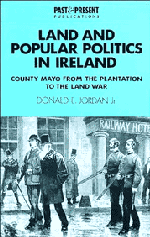Book contents
- Frontmatter
- Contents
- List of figures
- List of maps
- List of tables
- Acknowledgments
- List of abbreviations
- Introduction
- PART 1 COUNTY MAYO PRIOR TO THE FAMINE
- PART 2 THE POST-FAMINE TRANSFORMATION OF COUNTY MAYO
- PART 3 THE LAND WAR IN COUNTY MAYO
- 1 Mayo evictions: explanation of calculations and sources for Table 4.1 and Figure 4.1
- 2 Occupations of suspected Fenians, County Mayo, as recorded in police files, 1866-71
- 3 List of persons whose arrest is recommended under the Protection of Persons and Property Act, 1881, County Mayo
- 4 Explanation of categories and list of Land League meetings for Map 5.2 and Table 3.1
- Bibliography
- Index
- Past and Present Publications
4 - Explanation of categories and list of Land League meetings for Map 5.2 and Table 3.1
Published online by Cambridge University Press: 03 May 2011
- Frontmatter
- Contents
- List of figures
- List of maps
- List of tables
- Acknowledgments
- List of abbreviations
- Introduction
- PART 1 COUNTY MAYO PRIOR TO THE FAMINE
- PART 2 THE POST-FAMINE TRANSFORMATION OF COUNTY MAYO
- PART 3 THE LAND WAR IN COUNTY MAYO
- 1 Mayo evictions: explanation of calculations and sources for Table 4.1 and Figure 4.1
- 2 Occupations of suspected Fenians, County Mayo, as recorded in police files, 1866-71
- 3 List of persons whose arrest is recommended under the Protection of Persons and Property Act, 1881, County Mayo
- 4 Explanation of categories and list of Land League meetings for Map 5.2 and Table 3.1
- Bibliography
- Index
- Past and Present Publications
Summary
Explanation of Categories
“Three Fs” – fair rents, fixity of tenure and free sale of interest in the holding were the land reform objectives of the Tenant League during the 1850s and of the Irish parliamentary party at the beginning of the Land War.
“Self-government” – this was a neutral term that could refer to Home Rule or to complete independence for Ireland. The term was often left purposely undefined in order to bring the widest spectrum of nationalists into the land movement.
“Public works' jobs” – these were either government or landlord funded projects, usually for land reclamation or road building.
“Censure of land grabbing” – this refers to censuring farmers or shopkeepers who took up holdings from which the previous tenant had been evicted.
“Centure of tenants who pay rent” – this refers to cases where tenants on a given estate or parish had resolved not to pay rent until an abatement or other concession was granted by the landlord.
“Opposition to government” – these resolutions began following the arrest of James Daly, Michael Davitt and J. B. Kileen in November 1879 and are in opposition to those arrests.
- Type
- Chapter
- Information
- Land and Popular Politics in IrelandCounty Mayo from the Plantation to the Land War, pp. 329 - 331Publisher: Cambridge University PressPrint publication year: 1994



